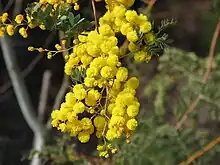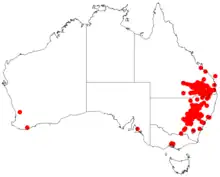| Acacia spectabilis | |
|---|---|
 | |
| Scientific classification | |
| Kingdom: | Plantae |
| Clade: | Tracheophytes |
| Clade: | Angiosperms |
| Clade: | Eudicots |
| Clade: | Rosids |
| Order: | Fabales |
| Family: | Fabaceae |
| Subfamily: | Caesalpinioideae |
| Clade: | Mimosoid clade |
| Genus: | Acacia |
| Species: | A. spectabilis |
| Binomial name | |
| Acacia spectabilis | |
 | |
| Occurrence data from AVH | |
| Synonyms | |
|
Racosperma spectabile (A.Cunn. ex Benth.) Pedley | |
Acacia spectabilis, commonly known as Mudgee wattle,[2] is an erect or spreading shrub, endemic to Australia.[2] Alternative common names include glory wattle, Pilliga wattle and golden wattle[1]
It grows to between 1.5 and 4 metres high and has pinnate leaves.[2] The bright-yellow globular flowerheads appear in axillary racemes, mostly between July and November in its native range.[2] These are followed by thin leathery pods which are 4–17 cm long and 10–19 mm wide.[2]
The species occurs naturally in dry sclerophyll forest and heath in New South Wales and Queensland and is commonly cultivated.[2]
References
- 1 2 "Acacia spectabilis". Australian Plant Name Index (APNI), IBIS database. Centre for Plant Biodiversity Research, Australian Government, Canberra. Retrieved 2009-08-22.
- 1 2 3 4 5 6 "Acacia spectabilis". PlantNET - New South Wales Flora Online. Royal Botanic Gardens & Domain Trust, Sydney Australia. Retrieved 2009-08-22.
This article is issued from Wikipedia. The text is licensed under Creative Commons - Attribution - Sharealike. Additional terms may apply for the media files.